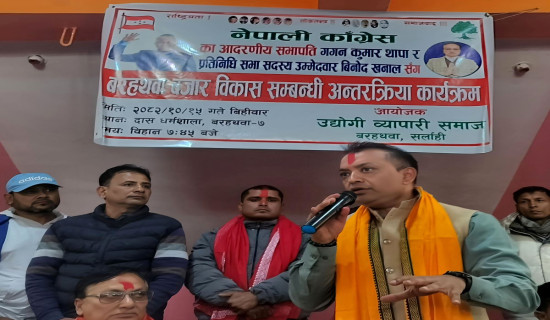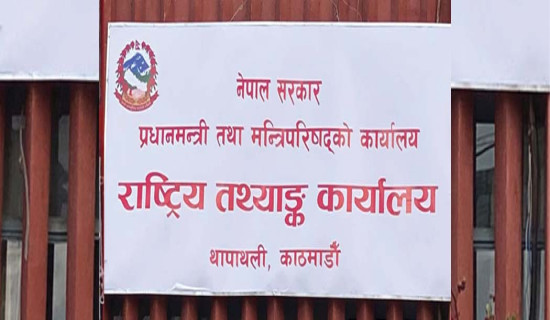- Friday, 30 January 2026
Economic reforms commission suggests policy shifts
Kathmandu, Apr. 12; The High-Level Economic Reforms Recommendation Commission has submitted its final report to the government with the suggestion for creating a conducive investment climate and bringing production costs down.
Earlier, the Commission had submitted an interim report to the government on January 8 covering the issues that needed to be addressed immediately.
Chairman of the Commission and Former Finance Secretary Rameshore Khanal presented the report to Deputy Prime Minister and Minister for Finance Bishnu Prasad Paudel at the Ministry of Finance on Friday.
While submitting the report, Khanal said that economic opportunities were not being created due to problems including weak overall demand side, decline in investment, inability to increase credit expansion and shrinking real estate transactions. The economic growth rate has remained sluggish due to overall demand side weakness since the start of the study by the Commission in the fiscal year 2021/22, he said.
Khanal said that consumption and investment have declined due to low credit growth, a decline in real estate transactions, savings of millions of people being trapped in the cooperative financial system, government not making some payments on time, problems in recovering commercial loans and the construction sector being in crisis.
The Commission said that demand-side policies alone are not sufficient to address the immediate problems of the economy, even though the overall demand side is weak.
Policy interventions to improve the demand side are urgently needed, but to achieve respectable economic growth, the Commission suggests that structural reforms on the supply side are also necessary to create an investment-friendly climate and reduce the cost of production to make it competitive.
The Commission suggests that the current economic slackness should be immediately addressed to provide dynamism to the economy, create economic opportunities, build a trust-based system, make sustainable and optimal use of available natural resources, build a borderless economy and increase the rate of economic growth while maintaining macroeconomic stability.
"Government policies and programmes need to be targeted towards creating economic opportunities for all by reducing structural barriers. A system based on the concept of control does not help create opportunities," the report has pointed out.
Repealing of over a dozen Acts suggested
The Commission has proposed repealing more than a dozen laws, amending more than a dozen others, and issuing some new laws for creating opportunities, building a trust-based system, and providing freedom to conduct economic activities.
Acts such as Income Stamp Duty Act, 2019 B.S, Black Market and Certain Other Social Offences and Punishment Act, 2032, Nationalisation of Private Forests and Jungles Act, 2013, Administrative Procedure (Regulation) Act, 2013, Compensation Act. 2019, Revenue Leakage (Investigation and Control) Act, 2052, Foreign Investment Prohibition Act, 2021, Nepal Agency Act, 2014, Regional Development Plans (Implementation) Act, 2013, Import and Export (Control) Act, 2013, Social Behaviour Reform Act, 2033, Nepali Currency Circulation Act, 2014 and Financial Intermediation Institutions Act, 2055 are suggested by the Commission to be repealed.
However, the Commission has recommended for a new “Intellectual Property Rights Protection Act” to address all the present day challenges of protecting intellectual property.
As sectoral economic policies cannot work without improving the institutional capacity and credibility of public bodies, the Commission has suggested appropriate reform measures.
The Commission has recommended reforms to reduce barriers in the sectors of economic growth, namely agriculture, forestry, land, mining, water resources, tourism, and information technology, and to expand opportunities in these sectors.
As the physical infrastructure development, urban development, energy security, education and skill development, health, and research and development are necessary to create opportunities in the areas of economic growth, the Commission has also identified policy interventions in these areas.
Similarly, the Commission suggests that disbursing concessional loans with interest subsidies should be done by the local level rather than by the federal government.
The report submitted by the Commission said that in a situation where the banking system has ample liquidity and the private sector is not increasing its demand for credit, the government should invest in high-yielding projects by issuing infrastructure bonds. It said that Nepal Electricity Authority should invest in hydropower projects by issuing energy bonds.
The commission has suggested for the capacity enhancement of the Credit Information Center and necessary legal arrangements to start the work of generating personal credit scoring. It has also recommended that credit information of all types of banks and financial institutions and cooperatives should be kept in an integrated way and used effectively while disbursing credit.
The Commission has suggested that Nepal Rastra Bank should make arrangements for providing loans at a fixed interest rate for a period of 3 to 5 years to manufacturing industries, small and micro enterprises and exporters, and that the regulatory arrangements should be made accordingly.
It has been suggested that the interest rate corridor should be implemented effectively for monetary management and the interest rate corridor should be gradually reduced to keep the interbank interest rate and policy rate close to the target.
The commission report recommends government agencies to pay all outstanding amounts to contractors and propose new projects in the next year's budget only if the budget is available.
Raise senior citizens' age, not the allowance Meanwhile, the Commission has suggested that the age of senior citizen allowance should be increased from 68 years to 70 years.
The Commission has suggested that allowances other than those provided for in the said Act should not be announced in the budget.
The Commission has suggested that social security allowances should not be increased for the next 5 years and then the allowance should be increased only every two years based on inflation.
Likewise, the report states that all types of social security should be linked to the national identity card and integrated statistics on social security availability. The report has suggested to avoid duplication of social security to be provided by the provincial and local levels of government.
The Commission said that the Ministry of Labour, Employment and Social Security should be given the responsibility of collecting and managing unified statistics on all types of social security.

















